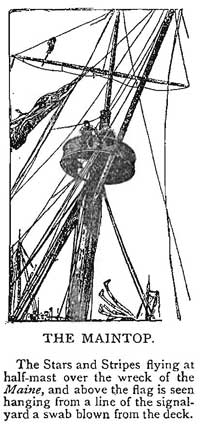
On the night of the explosion, the Maine, lying in the harbor of Havana at the buoy where she was moored by the Spanish pilot on her entrance into the port, was heading in a direction quite unusual - at least, for the Maine. In this connection it should be explained that Havana is in the region of the trade-wind, which, however, is not so stable there as farther to the eastward, especially in the winter months. During the day the wind is commonly from the eastward, and about sundown it is likely to die down. During the night there may be no wind at all, and a ship swinging at her buoy may head in any direction. On the night of the explosion the Maine was heading to the northward and westward, in the general direction of the Machina, or naval "sheers," near the admiral's palace. Some of the watch-officers said afterward that they had not before known her to head in that direction at Havana. I myself did not remark any peculiarity of heading, because I had not been on deck much during the night-watches. Stated simply as a fact, the Maine was lying in the position in which she would have been sprung to open her batteries on the shore fortifications. If an expert had been charged with mining the Maine's mooring-berth, purely as a measure of harbor defense, and having only one mine available, it is believed that he would have placed it under the position that the Maine occupied that night.

A short distance astern, or nearly astern, was the American steamer City of Washington, Captain Frank Stevens of the ward line. The Alifonso XII and the Legazpi occupied the berths mentioned heretofore. They were on the starboard side of the Maine. There were other vessels in the harbor, but they were more remote from the Maine's berth. It was a dark, overcast night. The atmosphere was heavy, and the weather unusually hot and sultry. All of the twenty-six officers(1) were aboard excepting Passed Assistant Engineer F. C. Bowers, Naval Cadet (Engineer) Pope Washington, Paymaster's Clerk Brent McCarthy, and Gunner Joseph Hill.
The members of the crew, three hundred and twenty-eight in number, were on board as usual. One of the steam-launches was in the water, and riding at the starboard boom. The crew, excepting those on watch or on post, were turned in. The men of the quarter-watch were distributed about the deck in various places, wherever they could make themselves comfortable within permissible limits as to locality. Some of the officers were in their state-rooms or in the messrooms below; others were on the main or upper deck, in or about the officers' smoking-quarters, which were abaft the after-turret, on the port side, abreast the after-superstructure.
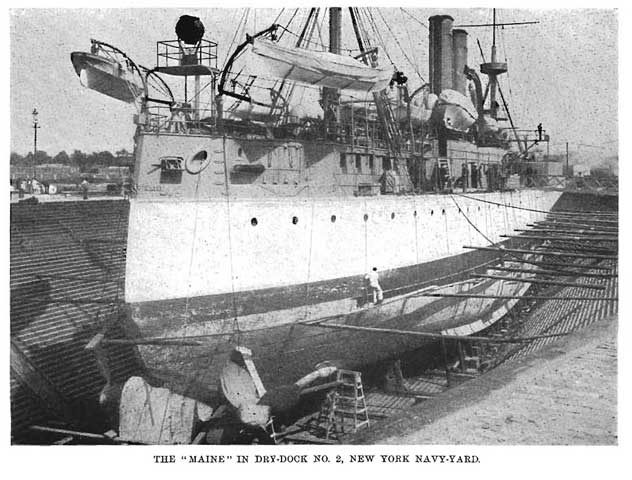
I was in my quarters, sitting on the after-side of the table in the port or admiral's cabin. As previously stated, the Maine had been arranged to accommodate both an admiral and a captain. For this purpose her cabin space in the after superstructure had been divided into two parts, starboard and port, which were perfectly symmetrical in arrangement and fittings. Looking from one cabin into the other through the large communicating doorway, one cabin was like the reflection of the other seen in a mirror. The two cabins were alike even in furniture. One of the illustrations in the book shows me sitting at the starboard-cabin table looking at the log-book. At the time of the explosion I was sitting in the port cabin in the corresponding position. The situation would be shown precisely if that illustration were reversed by reflection in a mirror.
About an hour before the explosion I had completed a report called for by Mr. Theodore Roosevelt, Assistant Secretary of the Navy, on the advisability of continuing to place torpedo-tubes on board cruisers and battle-ships. I then wrote a letter home, in which I struggled to apologize for having carried in my pocket for ten months a letter to my wife from one of her friends of long standing. The cabin mess-attendant, James Pinckney, had brought me, about an hour before, a civilian's thin coat, because of the prevailing heat; "! had taken off my blouse, and was wearing this coat for the only time during the cruise. In the pocket I had found the unopened and undelivered letter. Pinckney, a light-hearted colored man, who spent much of his spare time in singing, playing the banjo, and dancing jigs, was for some reason in an especially happy frame of mind that night. Poor fellow! he was killed, as was also good old John R. Bell, the colored cabin steward already referred to, who had been in the navy, in various ratings, for twenty-seven years.
At taps (" turn in and keep quiet "), ten minutes after nine o'clock, I laid down my pen to listen to the notes of the bugle, which were singularly beautiful in the oppressive stillness of the night The marine bugler, Newton, who was rather given to fanciful effects, was evidently doing his best. During his pauses the echoes floated back to the ship with singular distinctness, repeating the strains of the bugle fully and exactly. A half-hour later, Newton was dead.
I was inclosing my letter in its envelop when the explosion came. The impression made on different people on board the Maine varied somewhat. To me, in my position, well aft, and within the superstructure, it was a bursting, rending, and crashing sound or roar of immense volume, largely metallic in character. It was followed by a succession of heavy, ominous, metallic sounds, probably caused by the overturning of the central superstructure and by falling debris. There was a trembling and lurching motion of the vessel, a list to port, and a movement of subsidence. The electric lights, of which there were eight in the cabin where I was sitting, went out. Then there was intense blackness and smoke.
The situation could not be mistaken: the Maine was blown up and sinking. For a moment the instinct of self-preservation took charge of me, but this was immediately dominated by the habit of command. I went up the inclined deck into the starboard cabin, toward the starboard airports, which were faintly relieved against the background of the sky. The sashes were out, and the openings were large. My first intention was to escape through an air-port, but this was abandoned in favor of the more dignified way of making an exit through the passageway leading forward through the superstructure. I groped my way through the cabin into the passage, and along the passage to the outer door. The passage turned to the right, or starboard, near the forward part of the superstructure.
At the turning, some one ran into me violently. I asked who it was. It was Private William Anthony, the orderly at the cabin door. He said something apologetic, and reported that the ship had been blown up and was sinking. He was directed to go out on the quarter-deck, and I followed him. Anthony has been pictured as making an exceedingly formal salute on that occasion. The dramatic effect of a salute cannot add to his heroism. If he had made a salute it could not have been seen in the blackness of that compartment. Anthony did his whole duty, at great personal risk, at a time when he might have evaded the danger without question, and deserved all the commendation that he received for his act. He hung near me with unflagging zeal and watchfulness that night until the ship was abandoned.
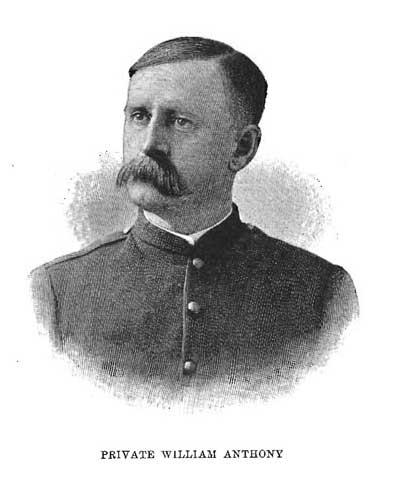
I stood for a moment on the starboard side of the main-deck, forward of the after-superstructure, looking toward the immense dark mass that loomed up amidships, but could see nothing distinctly. There I remained for a few seconds in an effort to grasp the situation, and then asked Anthony for the exact time. He replied: "The explosion took place at nine-forty, sir." It was soon necessary to retire from the main-deck, for the after-part of the ship was sinking rapidly. I then went up on the poop-deck. By this time Lieutenant-Commander Wainwright and others were near me. Everybody was impressed by the solemnity of the disaster, but there was no excitement apparent; perfect discipline prevailed.
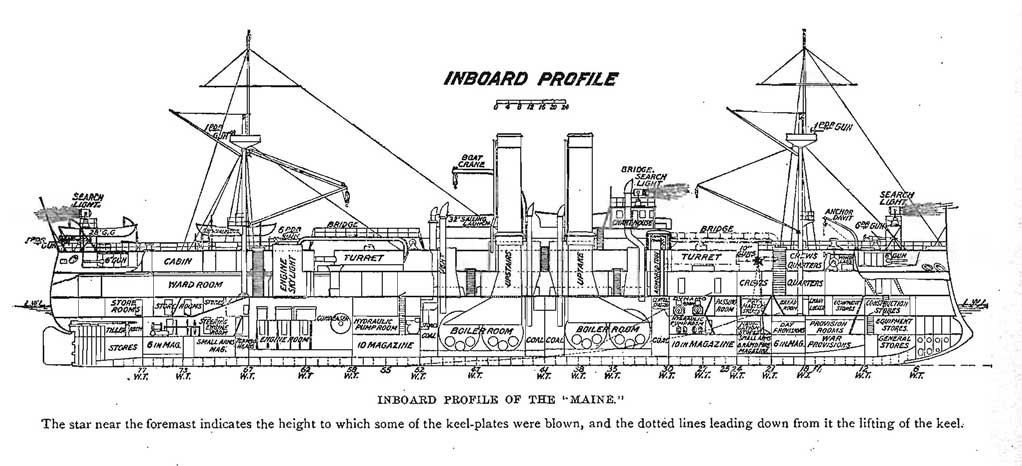
The question has been asked many times if I believed then that the Maine was blown up from the outside. My answer to this has been that my first order on reaching the deck was to post sentries about the ship. I knew that the Maine had been blown up, and believed that she had been blown up from the outside. Therefore I ordered a measure which was intended to guard against attack. There was no need for the order, but I am writing of first impressions. There was the sound of many voices from the shore, suggestive of cheers.
I stood on the starboard side-rail of the poop and held on to the main-rigging in order to see over the poop-awning, which was bagged and ' covered with debris. 1 was still trying to take in the situation more completely. The officers were near me and showing a courteous recognition of my authority and responsibility. Directions were given in a low tone to Executive Officer Wainwright, who himself gave orders quietly and directed operations. Fire broke out in the mass amidships. Orders were given to flood the, forward magazine, but the forward part of the ship was found to be under water. Inquiry as to the after-magazines and the gun cotton magazine in the after-part of the ship showed a like condition of those compartments, as reported by those who had escaped from the ward-room and junior officers' quarters. In the captain's spare pantry in the after-superstructure there was spare ammunition. It was seen that this would soon be submerged, and that precautions in respect to the magazines were unnecessary.
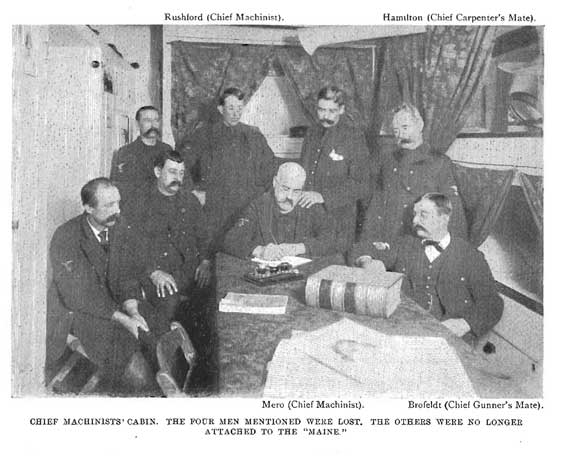
The great loss of life was not then fully realized. Our eyes were not yet accustomed to the darkness. Most of us had come from the glare of the electric lights. The flames increased in the central superstructure, and I directed LieutenantCommander Wainwright to make an effort to play streams on the fire if practicable. He went forward on the poop-awning, accompanied by Lieutenant Hood and Naval Cadets Boyd and Cluverius, making a gallant inspection in the region of the fire, but was soon obliged to report that nothing could be done. The fire-mains and all other facilities were destroyed, and men were not available for the service.
We then began to realize more clearly the full extent of the damage. One of the smoke-stacks was lying in the water on the starboard side. .Although it was almost directly under me, I had not at first identified it. As my eyes became more accustomed to the darkness, I could see, dimly, white forms on the water, and hear faint cries for help. Realizing that the white forms were our own men, boats were lowered at once and sent to the assistance of the injured and drowning men. Orders were given, but they were hardly necessary: the resourceful intelligence of the officers suggested correct measures in the emergency. Only three of our fifteen boats were available- the barge, the captain's gig, and the whale-boat. The barge was badly injured. Two of these were manned by officers and men jointly. How long they were gone from the ship I cannot recall, but probably fifteen minutes. Those of us who were left on board remained quietly on the poop-deck.
Nothing further could be done; the ship was settling rapidly. There was one wounded man on the poop; he had been hauled from under a ventilator on the main-deck by Lieutenants Hood and Blandin just as the water was rising over him. Other boats, too, were rescuing the wounded and drowning men. Chief among them were the boats from the Alfonso XII, and from the steamer City of Washington. The visiting boats had arrived promptly, and were unsparing of effort in saving the wounded. The Spanish officers and crews did all that humanity and gallantry could compass. During the absence of our boats the fire in the wreck of the central superstructure became fiercer. The spare ammunition that had been stowed in the pilot-house or thrown up from the magazines below was exploding in detail. It continued to explode at intervals until nearly two o'clock in the morning.
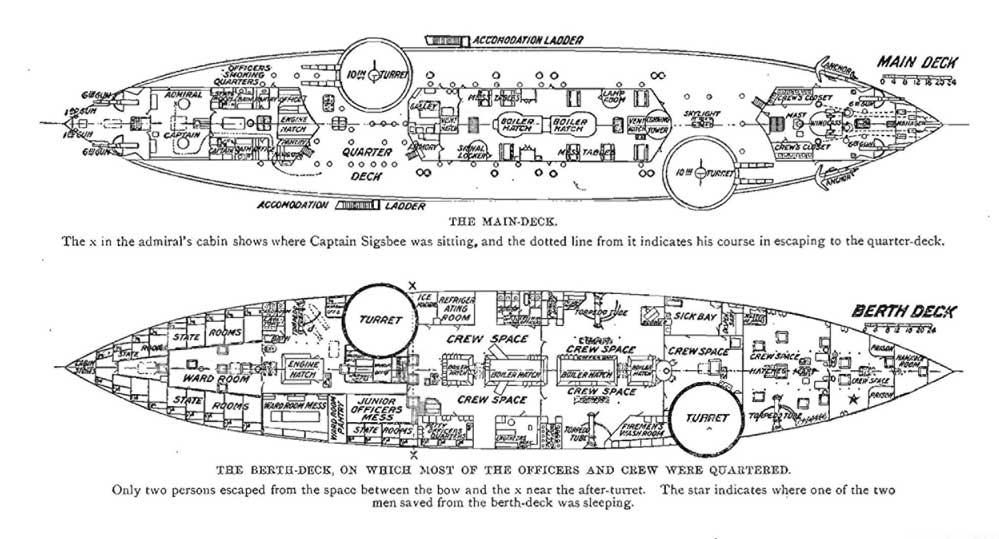
At night it was the custom on board the Maine to close all water-tight compartments except the few needed to afford passageway for the crew. They had been reported closed as usual that night. Down the cabin skylights the air could be heard whistling through the seams of the doors and hatches, indicating that even the after-bulkheads had been so strained as to admit the water into the compartments. Presently Lieutenant Commander Wainwright came to me and reported that our boats had returned alongside the ship at the stern, and that all the wounded that could be found had been gathered in and sent to the Spanish cruiser and the City of Washington and elsewhere. The after-part of the poop-deck of the Maine, the highest intact point above water, was then level with the gig's gunwale, while that boat was in the water alongside. We had done everything that could be done, so far as could be seen.
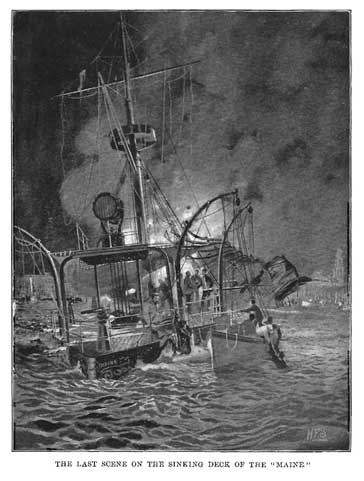
It was a hard blow to be obliged to leave the Maine; none of us desired to leave while any part of her poop remained above water. We waited until satisfied that she was resting on the bottom of the harbor. Lieutenant-Commander Wainwright then whispered to me that he thought the forward ten-inch magazine had been thrown up into the burning material amidships and might explode at any time, with further disastrous effects. He was then directed to get everybody into the boats, which was done. It was an easy operation; one had only to step directly from the deck into the boat. There was still some delay to make sure that the ship's stern had grounded, and still more because of the extreme politeness of the officers, who considerately offered me a steadying hand to step into the boat. Lieutenant-Commander Wainwright stood on one side and Lieutenant Holman on the other; each offered me a hand. I suggested the propriety of my being the last to leave, and requested them to precede me, which they did. There was favorable comment later in the press because I left last. It is a fact that I was the last to leave, which was only proper; that is to say, it would have been improper otherwise; but virtually all left last. The fine conduct of those who came under my observation that night was conspicuous and touching. The heroism of the wounded men I did not see at the time, but afterward good reports of their behavior were very common. The patient way in which they bore themselves left no doubt that they added new honors to the service when the Maine went down.
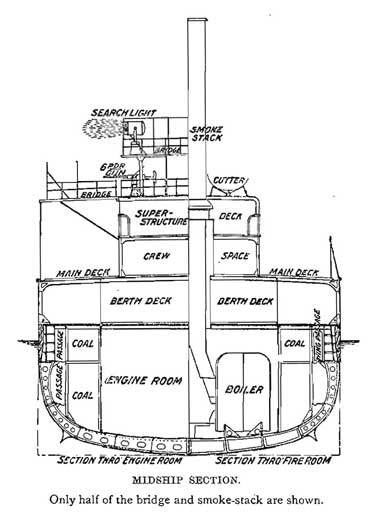
Our boats pulled to the City of Washington. On the trip I called, or sent, to the rescuing boats, requesting them to leave the vicinity of the wreck, and informing them that there might be another explosion. Mr. Sylvester Scovel, the newspaper correspondent, was asked to translate my request to the Spanish boats, which he did.
On arriving on board the City of Washington, I found there a number of our wounded men. They had been carried below into the dining saloon, where they had been placed on mattresses. They were carefully tended by both officers and crew of the vessel. Every attention that the resources of the vessel admitted had been brought to bear in their favor. The City of Washington, then under command of Captain Stevens, did great service. The same was true of the Alfonso XII, and, it may be, of the other Spanish vessels also. One or more wounded men were cared for on board the Spanish transport Colon.
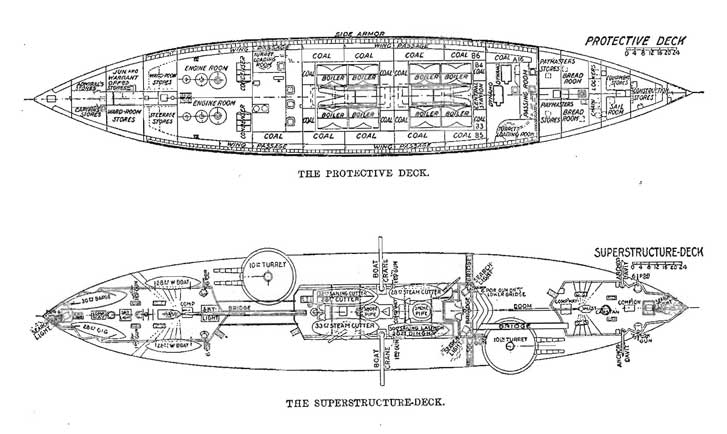
I walked among the wounded some minutes, and spent a few more in watching the fitful explosion of ammunition on board the Maine. Then I went to the captain's cabin, and composed my first telegram to the Navy Department, a facsimile of which faces page 76. I had already directed that a muster be taken of the survivors, and had sent a request to the captain of the Alfonso XII that he keep one or more patrol-boats about the wreck. The relations between the United States and Spain had reached a condition of such extreme tension that the patience of the people of the United States was about exhausted. Realizing this fully that night, I feared the result of first impressions of the great disaster on our people, for I found it necessary to repress my own suspicions. I wished them, as a matter of national pride and duty, to take time for consideration. Naval officers, no less than other citizens, have unlimited confidence in the sober judgment of the people of the United States. It seemed also to be a duty of my position to sustain the government during the period of excitement or indignation that was likely to follow the reception of the first report; therefore I took the course of giving to my telegram an uncommonly strong advisory character. The facsimile illustration of the telegram shows that, after advising that public opinion be suspended, and signing my name, I erased the name, and added a few more words relative to the visit and sympathy of the Spanish officers. I added these additional words to strengthen the quieting effect of the telegram. After my name had been signed in the first instance, I was informed that a number of Spanish officers - civil, military, and naval - had arrived on board to express sympathy. I went out on the deck, greeted these gentlemen, and thanked them for their visit. Among them were Dr. Congosto, secretary-general of the island; General Salano, chief of staff to General Blanco; the civil governor of the province, and a number of others whose names I cannot now remember. I think the captain of the Alfonso XII was also there. After asking them to excuse me. for a few moments, to complete my telegram, I returned to the captain's cabin, erased the first signature, and added the additional words. I then called in Dr. Congosto, read the telegram to him, and stated that, as there would be. great excitement in the United States, it was my duty to diminish it so far as possible. Dr. Congosto had been a Spanish consul in the United States, and a practising physician there for a number of years. He remarked feelingly that my telegram was "very kind."
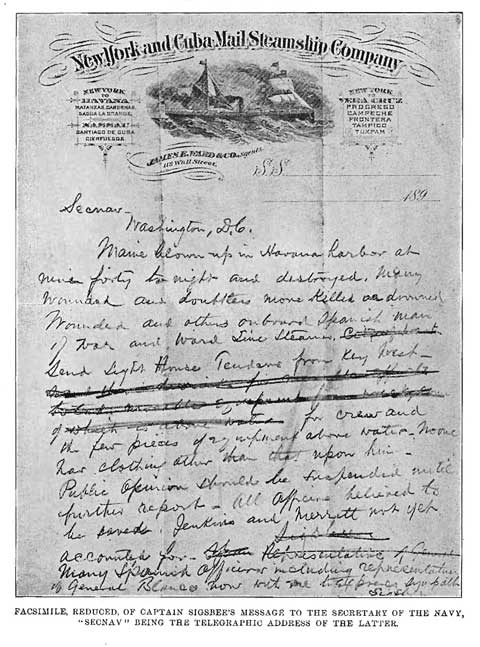
The next step was to get the despatch over the cable. It was written about fifteen minutes after we left the Maine, and had to be taken ashore in a boat, and thence in a cab to the telegraph office. It must therefore have reached the cable office about eleven o'clock. There was a likelihood that the office would be closed at that time of night, but Dr. Congosto promised me the right of way over the cable, and gave directions that the office, if closed, should be reopened. I requested Mr. George Bronson Rea, then correspondent, I think, of "Harper's Weekly," to carry the telegram ashore and send it. He readily consented. At the same time he also sent for me a telegram to Commander Forsyth, commandant of the naval station at Key West, conveying information of the disaster to Admiral Sicard. At the office he transcribed them to the regular forms, 'then, it appears, he sent the original of the longer despatch to a New York newspaper, where it was reproduced. Mr. Rea soon afterward volunteered to return me the original of the latter. It is through his courtesy that it is now in my possession. At the time it was written it did not occur to me that the document would be deemed worthy of preservation. It has been said in criticism that I should have used the word "judgment" instead of "opinion" in framing my telegram. "Opinion" was the more diplomatic word under the circumstances. The other might have given rise to a contention with the censor. It will be shown later how censorship in Cuba was applied to an official despatch from me to Washington announcing the grounding of my vessel by a Spanish pilot.

Having disposed of the telegram, I returned to the Spanish officials. They seemed especially desirous of having my opinion as to the cause of the explosion. I invariably answered that I must await investigation. General Salano, a handsome and distinguished-looking officer, of dignified bearing and address, declared to me that the Spanish authorities knew nothing whatever as to the cause of the destruction of the Maine. He said that he made the assertion as a man, an officer, and a Spaniard. I assured him of my ready acceptance of his statement, and remarked that I had not yet permitted myself to give any thought to the question of responsibility for the disaster. The Spanish officers remained only a short time. In the length of their visit, and the character of it, they showed exquisite tact. General Fitzhugh Lee arrived on board the City of Washington soon after we boarded her, and remained all night, I think. It has always seemed to me that it took high courage for the United States consul-general to traverse the city and the water during the uncertainties of those early hours.
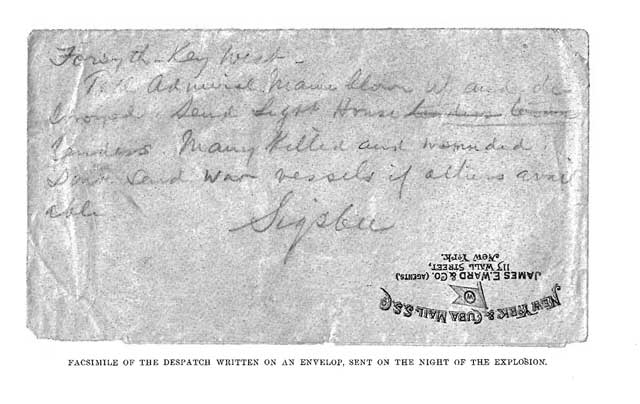
After the first muster that night it was reported to me that only eighty-four or eighty-five survivors could. be found. Recent summary see < Crew List and Mortuary Statistics, Appendices G and H) shows that only sixteen of the crew were wholly unhurt. Two officers and two hundred and fifty men were killed. One hundred and two people were saved, but later eight of these died at Havana. Some of the wounded were taken to the landing at the Machina, where they were cared for by the fire organizations of Havana. The wounded who were gathered in by the Spaniards and Americans that night were sent to two hospitals in Havana, the Alfonso XIII and the San Ambrosio. I was inclined to feel offended when the commanding officer of the cruiser Alfonso XII did not refer to me before he sent the wounded ashore; but I soon came to the conclusion that he had used his best judgment, and with every desire to be kind and sympathetic. The subsequent treatment of our wounded by the Spaniards was most considerate and humane. They did all that they habitually did for their own people, and even more.
This paper was given the form of a personal experience, first, because I alone was personally connected with the complete chain of incidents to be recited; secondly, because the form promised less labor of preparation in the time at my disposal. But the explosion, and its immediate consequences, were too momentous and harrowing, and too varied, to be narrowed down to the view of one person, even in so personal a narrative. None can ever know the awful scenes of consternation, despair, and suffering down in the forward compartments of the stricken ship; of men wounded, or drowning in the swirl of water, or confined in a closed compartment gradually filling with water. But from those so favorably situated that escape was possible, much may be gathered to enable us to form a conception of the general chaos. It is comforting to believe that most of those who were lost were killed instantly; and it is probably true, also, for many of the wounded who recovered had no knowledge of the explosion; they remembered no sensations, except that they awoke and found themselves wounded and in a strange place.
The phenomena of the explosion, as witnessed by different persons, and the personal experiences of officers and men, may be derived from the "Report of the Naval Court of Inquiry upon the Destruction of the United States Battle-ship Maine."(2) I have, in addition, reports from the officers of the Maine, and my recollections of conversations with those who were informed in various directions.
Before the court, Captain Frederick G. Teasdale, master of the British bark Deva, testified as follows: He was aboard the Deva, which was lying at a wharf at RegIa, from a quarter to half a mile from the Maine. He said, in continuation of his previous testimony: "sitting at the cabin table writing when I heard the explosion. I thought the ship had been collided with. I ran on deck when I heard the explosion. I felt a very severe shock in my head, also. I seized my head this way [indicating]. I thought I was shot, or something. The transoms. of the doors of the cabin are fitted in the studs on the side, and they were knocked out of place with the shock. The first seemed to be a shot, and then a second, or probably two seconds, after the first report that I heard, I heard a tremendous explosion; but as soon as I heard the first report, - it was a very small one,- thinking something had happened to the ship, I rushed on deck, and was on deck just in time to see the whole debris going up in the air. . . . The stuff ascended, I should say, one hundred and fifty or one hundred and sixty feet up in the air. It seemed to go comparatively straight until it reached its highest point of ascent; then it divided and passed off in kinds of rolls or clouds. Then I saw a series of lights flying from it again. Some of them were lights - incandescent lights. Sometimes they appeared to be brighter, and sometimes they appeared to be dim, as they passed through the smoke, I should presume. The color of the smoke, I should say, was a very dark slate-color. There were fifteen to twenty of those lights that looked like incandescent lights. The smoke did not seem to be black, as you would imagine from an explosion like that. It seemed to be more a slate-color.... Quantities of paper and small fragments fell over our ship, and for some time after."
Mr. Sigmund Rothschild, a passenger on board the City of Washington, went on deck about half-past nine with his fellow-passenger Mr. Wertheimer. They drew chairs toward the railing. Mr. Rothschild testified: "In doing so, I had brought my chair just about in this condition [indicating], and had not sat down when I heard a shot, the noise of a shot. I looked around, and I saw the bow of the Maine rise a little, go a little out of the water. It could n't have been more than a few seconds after that noise, that shot, that there came in the center of the ship a terrible mass of fire and explosion, and everything went over our heads, a black mass. We could not tell what it was. It was all black. Then we heard a noise of falling material on the place where we had been right near the smoking room. One of the life-boats, which was hanging, had a piece go through it and made a big hole in it. After we saw that mass go up, the whole boat [Maine] lifted out, I should judge, about two feet. As she lifted out, the bow went right down.... We stood spellbound, and cried to the captain [of the City of Washington]. The captain gave orders to lower the boats, and two of the boats, which were partly lowered, were found broken through with big holes. Some iron pieces had fallen through them. Naturally, that made a delay, and they had to run for the other boats, or else we would have been a few minutes sooner in the water. Then the stern stood out like this, in this direction [indicating], and there was a cry from the people: 'Help!' and' Lord God, help us!' and , Help! Help!' The noise of the cry from the mass of human voices in the boat [Maine] did not last but a minute or two. When the ship was going down, there was the cry of a mass of people, but that was a murmur. That was not so loud as the single voices which were in the water. That did not last but a minute, and by that time we saw somebody on the deck in the stern of the ship, and it took about a few minutes when the boats commenced to bring in the officers. [The last to come on board.] We took them to our rooms. A great many of them came without anything on but a pair of pants and nothing else. That is about the whole story in regard to the shot." Mr. Louis Wertheimer, another passenger aboard the City of Washington, gave testimony to the same effect.
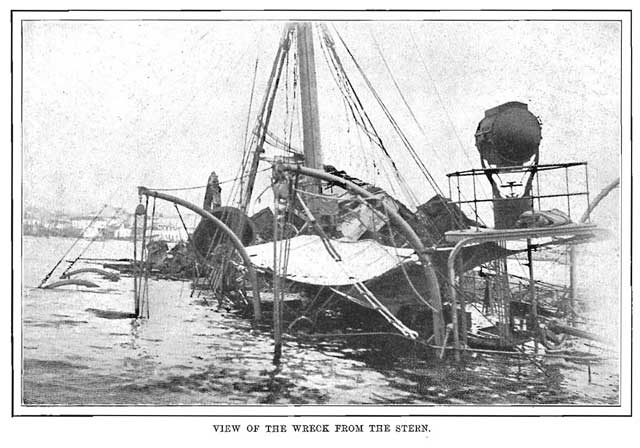
In his testimony First Officer George Cornell of the City of Washington said: "I was standing on the gangway, and giving the quartermaster orders to call the men at five o'clock in the morning. While I was standing there I heard a rumbling sound, and we saw the Ma£ne raise up forward. After that the explosion occurred, and the stuff was flying in the air in all directions. She sank· immediately at the forward end."
Captain Frank Stevens, master of the City of Washington, testified: "I heard a dull, muffled explosion and commotion, like as though it was under the water, followed instantly by a terrific explosion, lighting up· the air with a dull red glare, filling the air full of flying missiles, which lit all around us. We were struck, I think, in four places."
It has been said before that some of the Maine's officers and some of the crew were on the main or upper deck at the time of the explosion. We have the testimony of some of them relative to the phenomena. Lieutenant John Hood was one of these. His testimony is very interesting. I quote it at some length: "I was sitting on the port side of the deck, with my feet on the rail, and I both heard and felt - felt more than I heard - a big explosion, that sounded and felt like an under-water explosion. I was under the impression that it came from forward, starboard, at the time. I instantly turned my head, and the instant I turned my head there was a second explosion. I saw the whole starboard side of the deck, and everything above it as far aft as the after-end of the superstructure, spring up in the air, with all kinds of objects in it-a regular crater-like performance, with flames and everything else coming up. I immediately sprang myself behind the edge of the superstructure, as there were a number of objects flying in my direction, for shelter. I ran very quickly aft, as fast as I could, along the afterend of the superstructure, and climbed up on a kind of step. I went under the barge, and by the time I went up on the superstructure this explosion had passed. The objects had stopped flying around. Then I saw on the starboard side there was an immense mass of foaming water and wreckage and groaning men out there. It was scattered around in a circle, I should say about a hundred yards in diameter, . off on the starboard side. I immediately proceeded to lower the gig, with the help of another man. After I got that in the water several officers jumped in it, and one or two men. In the meantime somebody else was lowering the other boat on the port side. I heard some groans forward, and ran forward on the quarter-deck down the poop-ladder, and I immediately brought up on an immense pile of wreckage. I saw one man there, who had been thrown from somewhere, pinned down by a ventilator."
THE COURT. "May I interrupt Mr. Hood a moment? He said several officers jumped into the gig. He does not say for what purpose or what they did. That 'might leave a bad impression unless he states what the object was."
ANSWER. "They jumped into the gig, commanded to pick up these wounded men whom we heard out in the water. The orders had been given by the captain and the executive officer to lower the boats as soon as they came on deck. I spoke of lowering the gig because I was on the deck before they got up there, and began to lower it anyway, to pick up these men. As I was saying a minute ago, I found this one man lying there on the quarter-deck in this wreckage, pinned down by a ventilator. With Mr. Blandin's help we got him up just in time before the water rose over him. The captain and the executive officer ordered the magazines to be closed [flooded]. We all saw at once that it would be no use flooding the magazines. We saw that the magazines were flooding themselves. Then the captain said he wanted the fire put out that was starting up in the wreckage. I made my way forward through the wreck and debris, up to the middle superstructure, to see if anything could be done toward putting out this fire. When I got there I found nothing could be done, because the whole thing was gone."
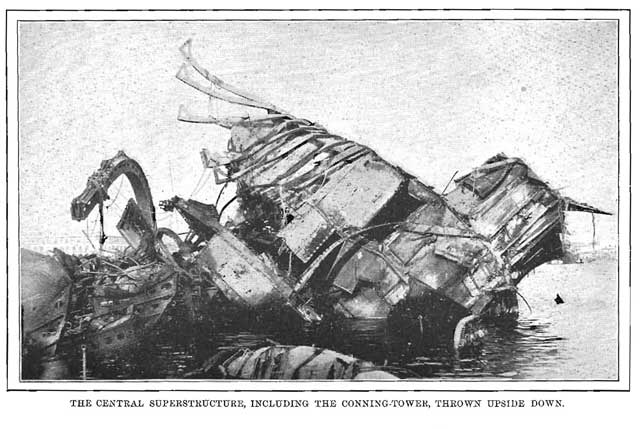
When I climbed up on this wreck on the superstructure I saw similar piles of wreckage on the port side which I had not seen before, and I saw some men struggling in that, in the water; but there were half a dozen boats there, I suppose, picking them up and hauling them out; and after pulling down some burning swings and things that were starting to burn aft, to stop any fire from catching aft, I came aft again out of the wreckage. There was no living thing up there at that time. Shortly after that we all left the ship. There were two distinct explosions - big ones - and they were followed by a number of smaller explosions, which I took at once to be what they were, I suppose-explosions of separate charges of the blown-up magazine. The instant this first explosion occurred I knew the ship was gone completely, and the second explosion only assisted her to go a little quicker. She began to go down instantly. The interval between the two was so short that I only had time to turn my head and see the second. She sank on the forward end - went down like a shot. In the short time that I took to run the length of that short superstructure aft, the deck canted down, showing that her bow had gone at once.
"At the same time the ship heeled over considerably to port, I should say about ten degrees, the highest amount, and then the stern began to sink very rapidly, too; so rapidly that by the time I got that gig lowered, with the assistance of another man or two, the upper quarter-deck was under water, and the stern was sinking so quickly that when I began to pick this man up, whom I spoke of on the quarter-deck, the deck was still out of water. Before I got this ventilator off him-it did n't take very long, as Mr. Blandin assisted to move that to get him up - the water was over my knees, and just catching this fellow's head, the stern was sinking that quickly. The bow had gone down, as I say, instantly." Special interest attaches to the personal experiences of Lieutenant John H. Blandin, who has since died. The disaster appeared to affect him greatly, and led, doubtless, to the impairment of his health. He had made an unusually long tour of continuous sea duty, and had suffered considerable disappointment because of his failure to secure his detachment from the Maine. For certain public reasons it had not been granted him, but it would have come soon. He said: "After the third quarter-watch at nine o'clock was piped down, I was on the starboard side of the 'deck, walking up and down. I looked over the side, and then went over to the port side and took a look. I don't remember seeing any boats at all in sight. I thought at the time the harbor was very free from boats. I thought it was about three bells, and I walked over to the port side of the deck, just abaft the after-turret. Mr. Hood came up shortly afterward, and was talking to me when the explosion occurred. I am under the impression that there were two explosions, though I could not be sure of it. Mr. Hood started aft to get on the poop to lower the boats, I suppose, and I followed him. Something struck me on the head. My cap was in my hand. My head was slightly cut, and I was partially knocked over, but not stunned. I climbed on the poop and went on the starboard side, and found Captain Sigsbee there. I reported to him. He ordered the boats lowered at once to pick up any of the wounded. The officers very rapidly got on the poop, and there were one or two men there, but very few.
"The barge and gig were lowered, and just then I heard a man crying out down on the quarter-deck. I went to the ladder, and I saw Mr. Hood trying to pull a ventilator off the man's legs. He was lying in the wreckage, jammed there. The water then was not deep. I went down and helped Mr. Hood to pull this ventilator off, and carried the man on the poop, with the help of Private Loftus, I think it was. It was a private man [marine]. Then the captain told Mr. Wainwright to see if anything could be done to put out the fire. Mr. Wainwright went forward to the middle superstructure, and shortly afterward came back and reported to the captain that it was hopeless to try to do anything. Then in a very few moments the captain decided that it was hopeless, and gave the order to abandon ship. Boats came from the Alfonso Doce, and two boats from the City of Washington, and those, with our boats, picked up the wounded and sent most of them, by the captain's order, to the Alfonso. There were thirty-four sent there. We abandoned ship, the captain getting in his gig after everybody had left, and went to the City of Washington."
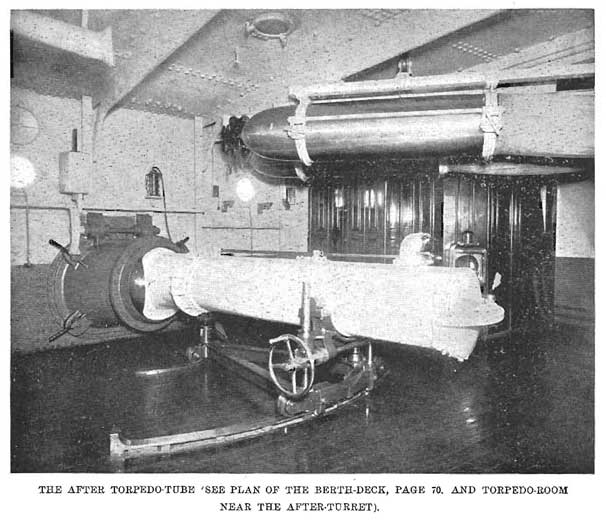
One of the narrowest escapes of an officer was that of Naval Cadet D. F. Boyd, Jr. I quote a large part of his report to me. It gives all that is known of the case of Assistant Engineer Darwin R. Merritt, who was drowned. " About nine-thirty, as well as I am able to judge, on the night of February 15, Assistant Engineer D. R. Merritt and I were sitting in the steerage [junior officers' mess-room] reading, when I heard a dull report, followed by the crashing of splinters and falling of the electric-light fixtures overhead. The lights were extinguished at the first report. I was struck by a small splinter and dazed for a moment. I grasped Mr. Merritt by the arm, exclaiming: 'Out of this! Up on deck!' Together we groped our way out of the steerage, and along the bulkhead in the after torpedo room, where we met a cloud of steam and tremendous rush of water. The force of the water separated us, and as I was lifted off my feet, I caught a steam-heater pipe, and reached for the steerage-ladder. It was gone. I worked my way along the steam-pipe until I reached the port side of the ship. Water was rushing through the air-port, and as I reached the side, I heard some one cry: 'God help me! God help me!' I think it must have been Merritt. At that moment I found the two torpedoes that were tried up under the deck-beams, and twining my legs
around them, I worked my way inboard.(3) The water was then at a level of about one foot from the deck-beams. At that moment some burning cellulose flared up, and I was able to reach the hatch-coaming and work my way up on deck. I rushed on the poop, and there found Captain Sigsbee, Lieutenant-Commander Wainwright, Lieutenants Holman and Hood, and Naval Cadet Cluverius. The remaining boats were away, picking up these men in the water. LieutenantCommander Wainwright and I then went on the quarter-deck awning and on the middle superstructure to help out any wounded. "When the captain gave the order to abandon ship, we were brought over in the Ward line steamer City of Washington's boat. The boats present, as well as I remember, were two of our boats, two from the City of Washington, three from the Alponso XII, and several shore boats." The circumstances connected with the loss of Lieutenant Friend W. Jenkins have been involved in much mystery. Lieutenant Holman testified that he himself, together with Lieutenants Jungen and Jenkins and Chief Engineer Howell, were in the officers' mess-room. All were saved but Lieutenant Jenkins. Mess attendant John H. Turpin (colored) was in the ward-room pantry, which is next forward of the officers' mess-room. In his testimony Turpin says: "It was a jarring explosion -just one solid explosion, and the ship heaved and lifted like that, and then all was dark. I met Mr. Jenkins in the mess-room, and by that time the water was up to my waist, and the water was running aft. It was all dark in there, and he hollered to me, and he says: 'Which way? I don't know what he meant by that. I says: 'I don't know which way.' He hollered again: 'Which way?' I says: 'I don't know, sir, which way.' And he hollered the last time; he says: 'Which way?' I says: 'I don't know, sir.' Then I was groping my way, and the water was up to my breast. Mr. Jenkins started forward, and then the whole compartment lit right up. That whole compartment where the torpedoes were lit right up, and I seen Mr. Jenkins then throw up both hands and fall, right by the steerage pantry. Then I groped my way aft, and got to the captain's ladder - the ladder coming out of the wardroom -just as you come out of the ward-room to go up in the cabin. When I got there the ladder was carried away, and somehow or other the man-rope kept fast upon the deck, but the ladder got adrift from it down below in the water. By that time the water was right up even with my chin. Then I commenced to get scared, and in fooling around it happened that a rope touched my arm, and I commenced to climb overhand and got on deck."
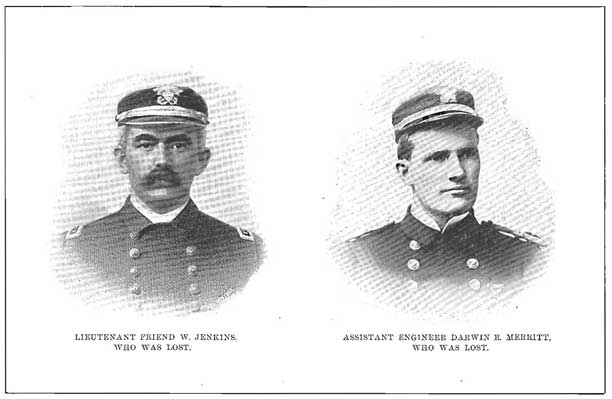
Fireman William Gartrell was in the steering engine room, two decks lower than the officers' mess-room. He was lower down in the ship than any other man that escaped. To reach the level of the officers' mess-rooms he had to run forward about twenty feet, pass through a doorway, spring across to a ladder, climb. up two flights of ladders, and pass through another doorway - a narrow and difficult route under the best of conditions (see profile of the Maine). I quote his testimony in part: "I could see through the door, sir. It was a kind of a blue flame, and it came all at once. The two of us jumped up, and I went on the port side up the engine-room ladder, and Frank Gardiner he went up the starboard side - at least, he didn't go up, because he hollered to me. He struck the door right there where the partition separates the two doors, and he must have struck his head. He hollered to me; he says: '0 Jesus, Billy, I am gone.' I didn't stop then, because the water was up to my knees. I made a break as quick . as I could up the ladder, and when I got up the ladder into the steerage-room the ladder was gone. Everything was dark. I couldn't see nothing; everything was pitch-dark, and I gave up, or I started to give up. The~e was a colored fellow with me; I didn't know his name until afterward. His name was Harris. We got hold of each other. I says: 'Let's give up; there is no hope.' I started in to say a prayer the best I knew how, and I heard a voice. It must have been an officer; it couldn't have been a man's voice, because he says: 'There is hope, men.' I knew from that that he was an officer. After that I seen a little light. It looked like an awful distance from me, but I made for that light, and when I got there it seemed like I could see the heavens. I got jammed in the ladder. My head was right up against the deck. I seen the ladder, and I caught hold of Harris, and the two of us hugged each other. . . . The ladder was hung crossways on top. There wasn't no ladder that we could walk up. The ladder was up above us.... I don't know whether I got out first, or this colored fellow, but when I did get out I tried to say a prayer. I looked where I was, and I saw the heavens and everything, and I tried to say a prayer or something, and I fainted away. I felt some one picking me up, and they throwed me overboard."
The foregoing extracts refer to those who escaped from that part of the ship that was not destroyed. The fearful loss of life was forward. I believe only two men escaped from the berth deck forward of the officers' quarters, the principal sleeping-quarters of the crew, namely, Charles Bergman, boatswain's mate, and Jeremiah Shea, coal-passer. I regret that I have no report of Shea's experience. He was sleeping below the great pile of wreckage that is the most prominent feature in the pictures of the wreck. Afterward, when asked to account for his miraculous escape, he replied: "I think I must be an armor- piercing projectile, sir." Bergman was turned in, in his hammock, which was swung from the beams in the forward crew-space, just abaft the "brig," or prison, on the starboard side. In his testimony Bergman says:
"I heard a terrible crash, an explosion I suppose that was. Something fell, and then after that I got thrown somewhere in a hot place. Where ever that was I don't know. I got burned on my ·legs and arms, and got my mouth full of ashes and one thing and another. Then the next thing I was in the water - away under the water somewhere, with a lot of wreckage on top of me that was sinking me down. After I got clear of that I started to come up to the surface of the water again, and I got afoul of some other wreckage. I got my head jammed in, and I couldn't get loose, so I let myself go down. Then it carried me down farther. I suppose when it touched the bottom somewhere it sort of opened out a bit, and I got my head out and started for the surface of the water again. I hit a lot of other stuff with my head, and then I got my head above the water. I got picked up by a Spanish boat, one of these shore boats, I think."
The narratives of others might be continued at much greater length, but the advisability is lessened by the existence of a very complete record in the report of the court of inquiry.
At 2 A. M. on the night of the explosion I lay down in a state-room of the City of Washington, hoping to get enough sleep to give me a clear head for the difficulties of the following day, which I knew would be great. The bunk was uncomfortable, the weather hot, and the stench from the harbor water disagreeable. A few feet from my state-room the wounded lay. Some of them groaned pitifully, and doubtless unconsciously; one had nausea. I tried hard to ignore all disturbances, but got very little sleep that night.
At daylight I again went among the wounded men. As I patted a wounded Japanese messman on the shoulder, the poor fellow looked greatly pleased, and made a futile effort to rise up and be respectful. Then I gazed long and sadly at the wreck of the Maine. How great the destruction! She had settled in the mud, and her poop-deck, where we had stood at the last moment, was under water. There was no part of her hull visible except that torn and misshapen mass amidships and three pieces of steel jutting out of the water farther forward, one of which was from the bottom plating of the ship. The forward part of the central superstructure had been blown upward and somewhat to starboard, and had folded back on its after-part, carrying the bridge, pilot-house, and six-inch gun and conning-tower with it, and completely capsizing them. The broad surface that was uppermost was the ceiling of the berth-deck, where many men had swung from beam to beam in their hammocks the night before. On the white paint of the ceiling was the impression of two human bodies,- mere dust,- so I was told afterward. The great pile was so torn, twisted, and confused with structural details that the identification of visible parts was only possible after careful study. The foremast had toppled over forward and disappeared. Only one end of the fore signal-yard was above water: this was well forward of everything else, and looked like a spar-buoy. Even the mooring-buoy had gone down. The cellulose from the coffer-dams was still burning.
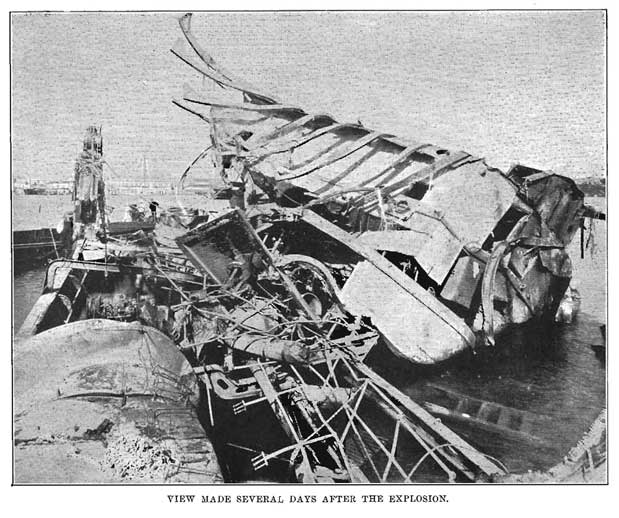
The Alfonso XII and the City of Washington had shifted their berths farther from the wreck during the night, to avoid the bursting rapid-fire ammunition. The Spanish patrol-boats were on duty. But saddest of all was the reflection that many dead were down there in the wreck, and that many homes were made desolate. It was not difficult to conceive what the day and the water would bring forth. My thoughts naturally turned toward Jenkins and Merritt, whose safety was in doubt; we had not wholly given them up for lost. Inquiries were made as to their movements the night before, but no hope could be built up. The officers of the Maine were in good physical condition that morning: none showed signs of nervous shock. The same is true of the uninjured men. None had saved more than he had upon him when the explosion came, and some had been wet by the filthy harbor water; kindhearted passengers and officers of the vessel had supplied deficiencies so far as possible, but we were a gruesome party. During the day the United States despatch-steamer Fern, Lieutenant- Commander W. C. Cowles commanding, arrived. So did the steamer Mangrove of the United States Lighthouse Establishment, with Commander Samuel Belden, U. S. N., on board, and the American passenger-steamer Olivette of the Plant line. Assistant Surgeon Spear of the flagship New York and Surgeon Clendenin of the army post at Key West came to render assistance. The day after the explosion of the Maine, I sent to Key West, by the Olivette, every officer and man that could be spared or who could travel. My desire was to retain no one in Havana that could get away; and thereafter the wounded men were taken from the hospitals and sent to Key West as soon as they could bear the journey. Miss Clara Barton, in behalf of the Red Cross Society, offered to place a specially prepared hospital at my service for the wounded men. The offer was gratefully declined on the ,ground that any removal at all should be to Key West. I retained on duty in Havana Lieutenant Commander Wainwright, Paymaster Ray, Dr. Heneberger, Chaplain Chidwick, Lieutenant Holman, and Naval Cadets Holden and Cluverius. I also retained my orderly, Private William Anthony, and a very worthy gunner's mate named Bullock. The greater part of that day was spent on the water, on board the visiting vessels already named, receiving reports, parting with the officers and men, and preparing for the work to come. In the forenoon I sent the following telegram to the Secretary of the Navy:
Advise sending wrecking-vessel at once. Maine submerged except debris. Mostly work for divers now. Jenkins and Merritt still missing. Little hope for their safety. Those known to be saved are: officers, 24; uninjured, crew, 18; wounded now on Ward line steamer, in city hospitals and hotels, 59, so far as known. All others went down on board or near the Maine. Total lost or missing, 253. With several exceptions, no officer or man has more than a part of a suit of clothing, and that is wet with water. Ward steamer leaves for Mexico at 2 this afternoon. The officers saved are uninjured. Damage was in compartments of crew. Am preparing to telegraph list of saved and wounded. Olivetteleaves for Key West at 1 P. M. Will send by her to Key West officers saved, except myself and Wainwright, Holman, Heneberger, Ray, and Holden. Will turn over three uninjured boats to captain of port, with request for safe-keeping. Will send all wounded men to hospital in Havana.
The following telegram was received from the Secretary:
The President directs me to express for himself and the people of the United States his profound sympathy with the officers and crew of the Maine, and desires that no expense be spared in providing for the survivors and caring for the dead.
The Olivette and the City of Washington left during the afternoon, the latter for Vera Cruz, Mexico, the wounded men having been transferred from her to the San Ambrosio Hospital.
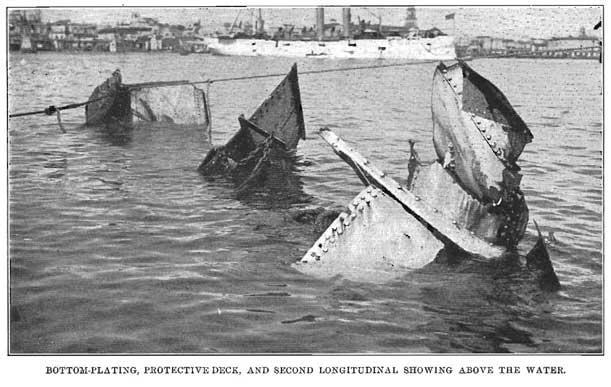
At 4 P. M. I went ashore and took up my quarters at the Hotel Inglaterra, where General Lee lived. Others of the Maine's officers were there with me or at another hotel near by. Lieutenant Commander Wainwright preferred to remain on board the Fern with his friend, Lieutenant Commander Cowles. Anthony and Bullock went with me to the Inglaterra. This hotel occupies a central position with respect to the harbor, the palace, the cable office, the consulate, the morgue, and the cemetery. It was the rational residence for me at the time. I remained there about a week. There were many evidences that the people of Havana, as a body, gave us sincere sympathy, at least at that time. That day, General Lee, whose opportunity for judging was better than mine, sent the following telegram to the Department of State:
Profound sorrow expressed by government and municipal authorities, consuls of foreign nations, organized bodies of all sorts, and citizens generally. Flags at half-mast on governor general's palace, on shipping in harbor, and in city. Business suspended; theaters closed. Dead number about 260. Officers' quarters being in rear and seamen's forward, where explosion took place, accounts for greater proportional loss of sailors. Funeral to-morrow at 3 P. M. Officers Jenkins and Merritt still missing. Suppose you ask that naval court of inquiry be held to ascertain cause of explosion. Hope our people will repress excitement and calmly await decision.
The swirl of responsibilities in which I found myself can well be understood. I had lost my vessel and more than two hundred and fifty of my crew in a foreign port, politically unfriendly at least, where I could not command the resources that were needed. It was a land of one creed. The recovery of the dead was reported. to me hour after hour; more were down in the wreck. State papers must be recovered, the vessel protected, the dead assembled, coffined, arid buried. Bereaved families and friends would be emotional, and might not be satisfied with my measures. There were questions of diplomacy, policy, investigation, resources, and expense; there were telegrams, private and official, to answer and to frame, during the day and far into the night, and statistics to gather and report. The situation was complex and trying. Although without personal dread of the responsibility as relating to myself or my career, I was much concerned to do only that which would meet the approval of my own government and of the relatives of the deceased men of the Maine.
We were face to face with innumerable difficulties when a large measure of relief came from an unexpected source. That night General Blanco, accompanied by the mayor of Havana, visited me at the hotel, where they personally expressed their sympathy and made offers of service. They requested that the authorities of Havana be allowed to give public burial to the dead already recovered from the Maine, in order that public sympathy and sorrow might be shown, and honor done the dead. While it seemed probable that the acceptance of this offer would not meet with approval on all sides among Americans who were most concerned, it was accepted with suitable acknowledgments. General Lee thought as I did in the matter. It is gratifying to remember that we were always in harmony. Relative to the visit of General Blanco and the mayor of Havana, I sent the following telegram to the Secretary of the Navy:
General Blanco called on me personally at the hotel last night, and also the mayor of the city. They have requested me to permit the government here to give a public burial to the dead already found, in order that public sympathy may be expressed thereby, and due honor shown the dead. Ground for the burial has been secured. It is assumed that I am expected by the department to bury the dead here. In fact, it would be impracticable to transport remains to the United States. Means and facilities are lacking. I have accepted the offer of the authorities, and there will be a public funeral ~ at 3 o'clock to-day. All here from the Maine will go; also a delegation from the Fern. Fifteen bodies recovered during operations. [Further] operations prevented by rough weather.
On the afternoon of February 17, funeral services were held over nineteen bodies, the first that were recovered. It was only necessary for the officers of the Maine to attend the funeral as mourners for the dead. We were notified that we were to appear at three o'clock at the municipal palace, which forms part of the building in which the government of the island is quartered, and in which the captain-general has his residence. On entering one of the state apartments, we found nineteen coffins, covered with mourning emblems of various kinds and from all classes of people, bearing the names of individuals and organizations - civic, military, and naval. No greater demonstration of sympathy could have been made.
At the gathering in the municipal palace I conversed with Dr. Congosto, and asked him to present me to the Bishop of Havana. Appreciating the sentiments of the relatives of those who were lost, I had previously asked Chaplain Chidwick if some arrangement could not be made whereby prayers might be read over the Protestant dead by a Protestant clergyman or by myself. He had referred the question to the bishop, who had politely negatived the proposition. I did not like this, because I desired to 'do everything in my power to comfort the families and friends of the deceased men; therefore, when I was presented to the bishop, I renewed my request, with a statement of the difficulties of the case. The bishop was very kind, but had to regret his inability to concede the point. I was much disturbed; in fact, I was indignant, for my mood in the presence of those coffins was one requiring great effort at self-repression; therefore I remarked to Dr. Congosto that if I had I been fully prepared for a refusal I should probably not have felt free to accept the offer of the Spanish authorities to take charge of the funeral ceremonies-that I should have preferred to take them under my own charge, in such a way that I could have given to each creed freedom to bury its dead after its own forms. In this I was doubtless lacking in tact. Nevertheless I was sincere. My position, sentimentally, was so difficult that I felt that I could speak plainly to Dr. Congosto, who, as I have already said, had lived in the United States. In my opinion, the. Bishop of Havana and Chaplain Chidwick were quite acceptable to officiate at the grave of any Christian: but this was not a matter for my opinion alone; others were to be considered. Having failed in my second request, I next requested that Chaplain Chidwick might officiate at the grave. This was promptly granted. I had brought to the palace an Episcopal prayer book, which I had procured at the last minute, intending to read the service myself, for no Protestant clergyman could be found in Havana; and, in fact, I did read the service, a part at a time, as opportunity offered, chiefly in the carriage on the way to the cemetery, and afterward in my room at the hotel.
The funeral cortege was very imposing. In addition to the hearses, there were many carriages and also a large military, naval, and civic escort, provided by the Spaniards. Even the poor reconcentrados were in line. No such demonstration had been made in Havana for very many years; in fact, I was informed that it had not been paralleled, except in one instance, in the history of Havana. The Bishop of Havana went to the cemetery in person, which, I was also informed, was a most unusual mark of sympathy. As the procession passed through the streets it seemed that all the people of Havana were present along the route, in respectful sympathy. At a certain point the carriages were stopped; the occupants alighted and marched, as an additional act of respect, for some distance, when they again entered the carriages and proceeded therein through the suburbs to the Colon Cemetery, one of the most beautiful that I have ever seen. The carriages were left just within the entrance, and, the procession continued to the grave on foot.
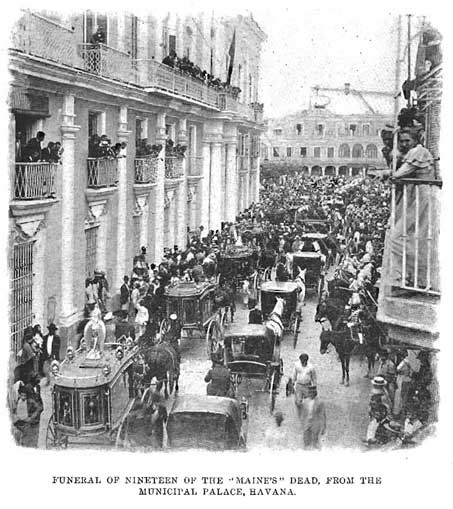
After the burial I again presented myself to the bishop, and apologized for having made a request which could not meet his approval. I thanked him for his sympathy and kindness, and assured him that I believed he had gone to the utmost limits of his authority. He replied that he had done all that he could, and drew attention to the fact that he had buried all of the Maine's men in the same plot of ground, without respect to creed, Protestant or Catholic. It was quite true, and the ground was given for all time to the United States, without expense. After the funeral, I sent the following telegram to the Navy Department:
Nineteen of Maine's dead were buried this afternoon, with great civil, ecclesiastical, naval, and military ceremonies, and with all the resources of Havana brought into requisition. The Spanish government, under express directions of General Blanco, the Bishop of Havana, General Parrado, Admiral Manterola, and the mayor of Havana, took complete charge of all arrangements. The bodies were first laid in state in the building of the civil government of Havana, where they were covered with floral and other emblems suitable to the occasion, which were presented by officials and other persons of Havana, of all shades of political opinion. They were escorted to the cemetery by representatives of all military, naval, and civil organizations, and foreign consular officers, and through a vast concourse of people spreading over the route. General Lee, myself, and officers and men of the Maine now here, together with Lieutenant-Commander Cowles and members of the Fern's crew, were given special carriages and conveniences. Ground for the burial of all the Maine's dead has been presented by General Blanco and the Bishop of Havana. The utmost sympathy and respect have been shown. I am informed by the authorities that this is the second instance only of such a demonstration having been shown to foreigners in the history of Havana. It is inconceivable that a greater demonstration could have been made. To me personally a great number of people have expressed sympathy for the Maine and for the United States government and people. The remainder of the dead must, perforce, be buried with brief ceremony, which will be conducted by ourselves, but the care and preparation of the remains will be with the Spanish authorities. About forty in addition to those buried have come ashore to-day. Very few are now recognizable. Even in the case of some of those who are hurt, but live, recognition is difficult. I have not for a moment lost sight of the grief of the families and friends of the members of my crew, but I beg the department to explain to them that it is impracticable, in fact impossible, to send bodies home. Facilities are lacking, and embalmment is necessary to secure shipment, even under the most favorable circumstances. Embalming is only imperfectly done here. Will wire all cases of identification. I maintain organization among my small force here, but it can be well understood that the execution of the work with which we are charged is one of much detail and difficult of execution. It is believed that all of the department's telegrams have reached me. I am deeply grateful for the helpful sentiments and directions telegraphed by the President and the department. I have the earnest help of all the officers of the Maine now here, which was to be expected under all circumstances. A previous telegram sent to-day gives the names of those buried by the Spanish authorities. The flags of all vessels, naval and merchant, in Havana harbor have been at half-mast yesterday and to-day. Shall send Mangrove back to Key West to-morrow with eight wounded. Will wire names later. Dr. Clendenin of the army will remain with the wounded. Assistant Surgeon Spear also came with the Mangrove, but will be detained here on board the Fern, to accompany others of the wounded when they are ready to be removed. Will put some divers at work to-morrow. Divers requested of Admiral Sicard will be here Saturday morning by the Olivette. Recovery of Maine's battery impracticable, except by regular wrecking outfit.
The burial of those nineteen men ended the official demonstration on the part of the Spaniards, which was proper. Thereafter, having been furnished the facilities for subsequent burials, we were allowed to proceed in our own way. Chaplain Chidwick, assisted by a most devoted and kind-hearted undertaker, a Spaniard, identified the bodies, and saw them prepared for the grave. After that he conducted the burials so long as we continued to inter the bodies at Havana. When it became possible to forward them to Key West by steamer, they were sent in that way and buried at Key West. Surgeon Heneberger gave his attention to the wounded and to mortuary statistics, while Paymaster Ray quietly, and with the greatest promptness, managed the financial intricacies of the situation.
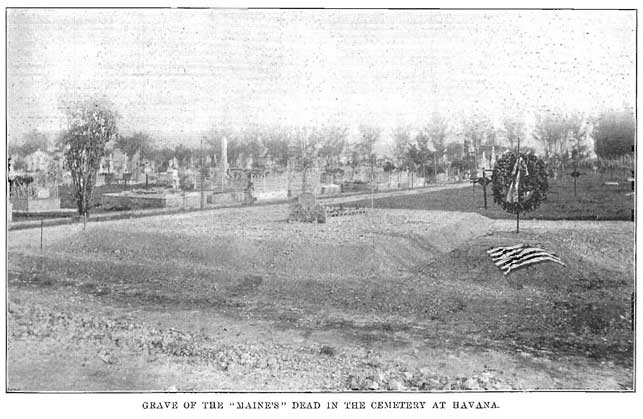
I felt that I took upon myself a great moral responsibility in burying the Maine's dead at Havana; but in the tropics it was necessary to bury the dead very promptly, which may well be imagined.. Fault' was found with me on some sides by a few patriotic citizens of the United States for permitting the Spanish authorities to bury our dead; but I thought that I knew the administration of our government and the people of the United States well enough to count on their approval of my course as the only one practicable in the circumstances in which we were so unfortunately placed. Results showed that I was not mistaken.
It is exceedingly difficult for the American mind to comprehend certain subsequent proceedings of the Spanish officials. I t can be explained only on the ground that Spanish authority in Cuba has so long been dominant and exacting that Spanish officials do not know how to unbend in a practical way, as we understand it, t, however much they may concede in the way of sentiment and sympathy. I have stated that on the night of the disaster I requested the captain of the cruiser Alfonso XII to place patrol-boats about the Maine to guard her from intrusion. The request was complied with, and thereafter, for many days, the Spanish boats kept up their patrol. Nobody was allowed to approach the wreck without proper authority; but at first their vigilance extended, adversely, even to the captain and officers of the Maine.
On the first or second day after the explosion, I myself attempted to go on board the wreck. I was stopped by a Spanish patrol-boat, which refused to allow me on board, even when it was explained that I was the captain of the Maine. My first impulse was to ignore the boats and force a passage on board; but, on second thought, I went on board the Alfonso XII, and suggested to her captain that the Spanish boats had misconceived their orders, since they had declined to allow me to board the wreck. The captain explained that it was simply a matter of identification, and that he would give me certain passes for myself and officers whereby I could pass the patrol. I approved this plan on the ground that, having asked him to set the patrol, it was only proper that I should support him in demanding complete identification. But I could not understand why passes had not been sent me before.
Shortly afterward I became very much concerned at the slow recovery of bodies. It was evident theft many were down in the wreck. I knew that relatives and friends would be urgent at the Navy Department, and it was very necessary to respect their sentiments. I felt it very keenly. At the American consulate I had met certain Cuban divers, and arranged that they should visit me the next day with a view to going down in the Maine for the recovery of bodies. These divers afterward disposed of their services to an American newspaper correspondent, who visited me in their company. He offered - as I then knew, by direction of his paper - to send down the divers entirely at the expense of his paper, for the avowed purpose of recovering the dead. I suspected at the time that his paper had directed him to make an investigation of the wreck of the Maine. Of course I declined any effort to anticipate the official investigation; but finally, when the correspondent surrendered his divers to me and placed them absolutely under my direction, I sent them over to the wreck with an officer, with instructions to allow them to make a descent, under his superintendence, for the sole purpose of recovering bodies. The party was stopped by the Spanish boats with the remark that "no American diver could go down without a Spanish diver, and no Spanish diver without an American diver."
I also was not allowed to go on board to hoist the national ensign. This was taking charge of matters unjustifiably. In respect to these several hindrances, I had received no notification in advance. However grateful I was for the good offices of the Spanish officials, I could not concede such a state of things. Shortly after these incidents, and while I was preparing to visit the A lfonso XII to protest, her captain chanced to come aboard the' Fern to make a return visit of ceremony, I believe, to that vessel's commander, Lieutenant-Commander Cowles. I stated the case to the Spanish captain, and asked if the Spanish boatmen had misconstrued his orders. He was requested to take such measures as would insure me thereafter access to the wreck of the Maine without any interference, on the presentation of a pass or identification paper. He was somewhat embarrassed, and courteously explained that he was obeying the orders of Admiral Manterola, to whom I should appeal. I assured him that I fully realized that he must obey his orders, and said that I would carry the case higher. Then the conversation was changed to more agreeable topics.
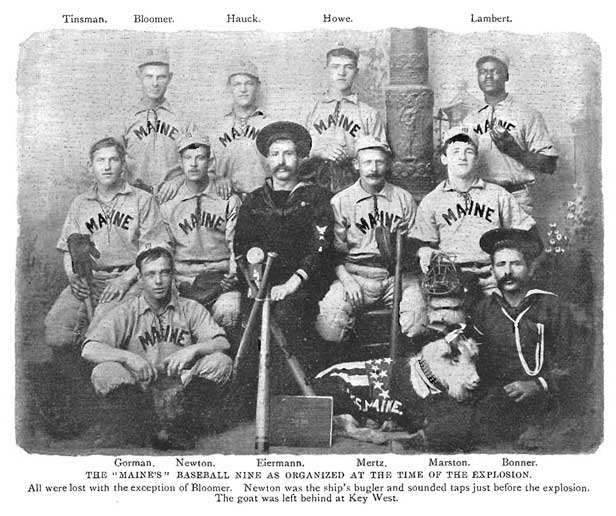
It was not my intention to apply to the Admiral, because I felt that the case should be taken from the hands of subordinates. The matter was reported to General Lee, who made an appointment for us with Captain and Governor-General Blanco. When we visited General Blanco, there were present, besides himself, only Dr. Congosto, General Lee, and myself. General Lee recited the circumstances to which I have already referred; he did it gravely and with due composure. Although outwardly composed, I was naturally indignant that an officer in my difficult position should be hedged in with vexatious restrictions, and determined to demand that they be ended. I suggested to General Lee that I, as a naval officer, understood international comity as applying to my command, for which reason I hoped that he would trust me to state my view· of the case. He at once complied.
I then reminded General Blanco, through Dr. Congosto, who acted as interpreter, that the Maine had entered the port of Havana with, at least, the implied assent of the Spanish government; that having so entered, she was constructively under the protection of the Spanish government and entitled to extraterritorial courtesy and to exemptions from local jurisdiction and control, as recognized in international law. So far as her internal affairs were concerned, she was entitled, under international usage and courtesy, to be considered a part of the territory of her own country, and under the direction of her own commanding officer, who was responsible to his government. Nevertheless, an attempt had been made to keep me out of my command while my pennant was flying at the masthead; and Admiral Manterola had undertaken to say when I could or could not be permitted to visit my command. I stated further that so long as my pennant flew I could yield no part of my responsibility without orders, and I hoped he would remove restrictions.
General Blanco urged that there should be a joint investigation; that a Spanish law required a Spanish investigation, and Spanish honor was involved. To which I replied that I recognized that the Spanish government had a moral right to investigate the loss of the Maine, but that any investigation by the Spanish government within the ship should, properly, be pursued after an appeal directly to the United States government. I said that although I did not believe the United States would consent to a joint investigation, it was probable that the government would desire that Spain should have an opportunity to make an independent investigation.
General Lee took the same ground, and entered into the discussion generally. We both agreed that we should take pleasure in approving to the United States government an independent investigation by the Spanish government. General Blanco yielded with the remark that, if the interior of the vessel was subject to the control of the United States, the outside was under the control of Spain. I then said that I should refrain from exploring the harbor. Dr. Congosto replied with some spirit, "You may, if you like." Knowing that the remark should not be taken seriously, I again disclaimed any intention of pursuing our operations into the region surrounding the Maine.
The interview was ended pleasantly with the promise of General Blanco to issue immediate orders to Admiral Manterola to give me access to the Maine thereafter. That day the United States national ensign was hoisted, and then hauled down to half-mast, where it remained always, day and night, during the remainder of my stay at Havana. The ensign on board a national ship is hauled down at sundown, and is not again hoisted until eight o'clock the following morning. Since the Maine was blown up at 9:40 P. M., it is apparent why her flag was not up until I hoisted it on that occasion. In keeping it up, day and night, I desired to make it clear that interference with the ship was interference with the flag. Most of the photographs of the wreck of the Maine show the flag at half-mast.
The incident which I have related made my position stronger thereafter, so far as pertained to my own control of the Maine. It was not again questioned until just before my departure from Havana.
Notwithstanding the sympathy with the survivors of the Maine evinced in Havana, the local press was not friendly. Certain papers made petty and unfavorable remarks about me, quite different from those in the press of the United States in respect to Captain Eulate personally, when the Vizcaya visited New York, while the excitement over the loss of the Maine was at its highest. On the other hand, a part of our press was merciless toward the Spaniards generally, and this did not tend to make more comfortable the position of the survivors of the Maine at Havana. There was reason to believe that the tone of these papers was galling to the Spaniards:
At the funeral of nineteen men of the Maine on February 19, I had worn a civilian's sack suit. I had nothing else. Lieutenant-Commander Cowles of the Fern was in uniform, and quite generally passed as Captain Sigsbee. One of the Havana papers - one can hardly say newspapers - made a sneering comment, even at that time, at my having appeared in uniform, although my uniform had been reported lost. The Spanish press has persisted in declaring that I and many other officers of the Maine were not on board at the time of the explosion. Spanish officials everywhere in Havana knew to the contrary. I have been informed that a Spanish officer, on the eve of leaving the United States, where he had been a prisoner, having been captured in honorable fight, thought fit to assert that I had wept in Havana, and deplored the ending of my naval career. The report seems incredible, and it would be undignified to deny so absurd a statement. My own reserve heretofore has not failed of appreciation on the Spanish side. After the war was opened, a Spanish officer of high rank at Havana sent me his kind regards by returned prisoners.
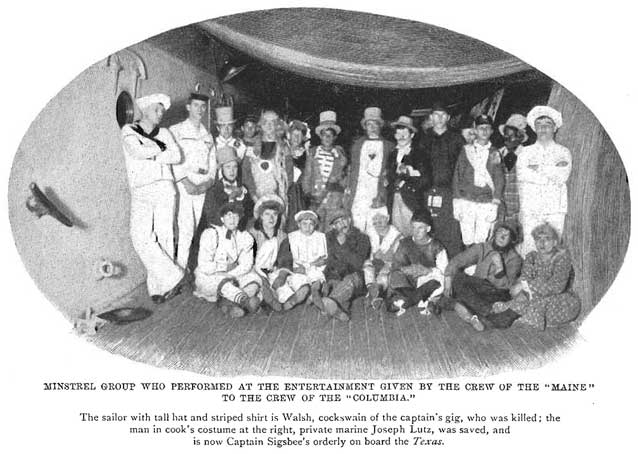
On February 20 I visited the San Ambrosio Hospital to see the wounded men. There had been some, cases of yellow fever at the hospital, and we felt concern at that fact, but there was probably no hospital in Havana where yellow fever had not been present at one time or another.
There can be no doubt that the Spaniards gave us the benefit of the best they had at their disposal. To enter the ward where our men were installed it was necessary to pass through a ward of Spanish invalids, many of whom appeared to be convalescent. At the entrance of the ward set aside for our use there was exhibited a characteristic bit of Spanish courtesy. On the wall was a placard demanding that all who entered that room should remove their hats. I visited each cot and talked with each patient, asked his location on board the Maine at the time of the explosion, his sensations and experiences, and wished him speedy recovery. They seemed delighted to welcome me, and said pleasant things, in forgetfulness of their own sufferings. At that hospital, Andrew V. Erikson, seaman, and Carl A. Smith, seaman, had died on the 15th, Alfred ]. Holland, cockswain, on the 10th, and Harry Jectson, seaman, and Frank Fisher, ordinary seaman, on the day of my visit. George A. Koebler, apprentice, first class, and Frederick C. Holzer, ordinary seaman, both young and excellent men, were very low.
Keebler was a handsome, cheery, willing, and capable apprentice, equally a pronounced favorite forward and aft. When there was doubt as to the proper man to employ for any confidential service, young Koebler was generally selected. He was in everything that was going on, on board the Ma£ne, and had lately been married in Brooklyn, New York. It was his habit to come to me occasionally and ask my advice in his private affairs. I found that he accepted it and acted upon it. He was delirious during my visit, but in some way became aware of my presence as soon as I entered the ward. He kept calling for me, so I visited him out of his regular turn. Imagining that the Maine was to go to New Orleans and leave him at the hospital, he declared that he was able to go on board, that it was not right to leave him there, and appealed to me to take him with me. But he became perfectly quiet and resigned when I assured him that the Maine should never leave Havana without him. It was very affecting. Poor fellow! he died on the 2nd
Holzer seemed in better condition than Koebler, and gave us the hope that he would recover. His mind was clear. When I took his hand he said: "Captain, I'm sorry such bad luck has come upon you." I replied: "Thank you, Holzer; I fear you have sailed with the wrong captain this time." He disputed the point with such nice consideration that my hope for him was strengthened, but he died on the 25th. Holzer was Chaplain Chidwick's assistant at religious services; the chaplain had a high regard for him, and felt his loss keenly, as we all did.
It was not until February 23 that I managed to read newspapers from the United States. The tone of the press toward me and the officers and men surprised and pleased me. It was sympathetic and commendatory, and without rebuke. The importance attached to my first telegram was far beyond my anticipation. Although I had hoped that some good effect might flow from the despatch, it had not entered my mind that it would reflect on me in a laudatory sense. It was hardly possible that a captain who had just lost his ship should look further than exoneration so soon afterward.
(1) The officers of the Maine at the time were: captain, Charles D. Sigsbee; executive officer Lieutenant-Commander Richard Wainwright; navigator, Lieutenant George F. W. Holman; lieutenants, -John Hood and Carl W. Jungen; lieutenants, junior-grade, George P. Blow, John J. Blandin, and Friend W. Jenkins; naval cadets, Jonas H. Holden, Watt T. Cluverius, Amon Bronson, Jr., and David F. Boyd,]r.; surgeon, Lucien G. Heneberger; paymaster, Charles M. Ray; chief engineer, Charles P. Howell; passed assistant engineer, Frederic C. Bowers; assistant engineers, John R. Morris and Darwin R. Merritt; naval cadets (engineer division), Pope Washington and Arthur Crenshaw; chaplain, John P. Chidwick; first lieutenant of marines, Albertus W. Catlin; boatswain, Francis E. Larkin; gunner, Joseph Hill; carpenter, George Helms; pay-clerk, Brent McCarthy.
(2) United States Senate Document No. 207, Fifty-fifth Congress, Second Session.
(3) The ladders and hatches by which the officers and others escaped were inboard from this tube. Naval Cadet Boyd clasped his legs around the torpedoes slung to the ceiling, or underside of the maindeck, when the compartment was nearly full of water, and worked his way to the hatch. Lieutenant Jenkins's body was found wedged against these torpedoes.